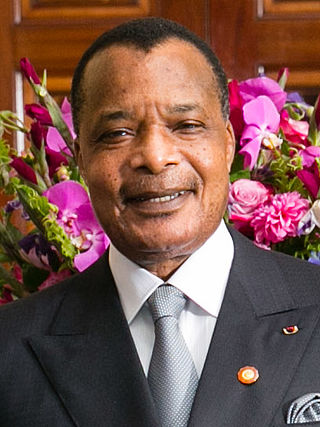
Denis Sassou Nguesso is a Congolese politician and former military officer who became president of the Republic of the Congo in 1997. He served a previous term as president from 1979 to 1992. During his first period as president, he headed the Congolese Party of Labour (PCT) for 12 years. He introduced multiparty politics in 1990, but was stripped of executive powers by the 1991 National Conference, remaining in office as a ceremonial head of state. He stood as a candidate in the 1992 presidential election but placed third.
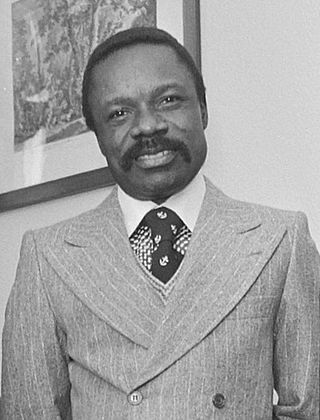
Omar Bongo Ondimba was a Gabonese politician who was the second president of Gabon from 1967 until his death in 2009. Bongo was promoted to key positions as a young official under Gabon's first President Léon M'ba in the 1960s, before being elected the second vice-president in his own right in 1966. In 1967, he succeeded M'ba to become the country's president, upon the latter's death.

Gabriel Léon M'ba was a Gabonese politician who served as both the first Prime Minister (1959–1961) and President (1961–1967) of Gabon.
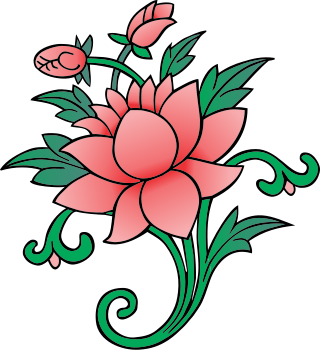
A lineage in Buddhism is a line of transmission of the Buddhist teaching that is "theoretically traced back to the Buddha himself." The acknowledgement of the transmission can be oral, or certified in documents. Several branches of Buddhism, including Chan and Tibetan Buddhism maintain records of their historical teachers. These records serve as a validation for the living exponents of the tradition.
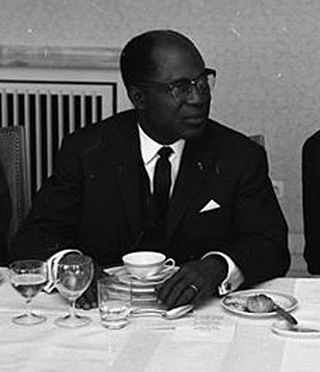
Jean-Hilaire Aubame was a Gabonese politician active during both the colonial and independence periods. The French journalist Pierre Péan said that Aubame's training "as a practicing Catholic and a customs official helped to make him an integrated man, one of whom political power was not an end in itself."
Teso is an Eastern Nilotic language spoken by the Teso people of Uganda and Kenya and some speakers are in South Sudan. It is part of the Teso–Turkana language cluster.
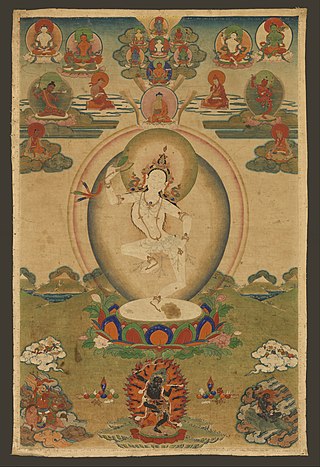
Machig Labdrön, or "Singular Mother Torch from Lab" (1055–1149), was a female Tibetan Buddhist monk believed to be a reincarnation of Yeshe Tsogyal, and the renowned 11th-century Tibetan tantric Buddhist master and yogini that originated several Tibetan lineages of the Vajrayana practice of Chöd.
Chöd is a spiritual practice found primarily in the Yundrung Bön tradition as well as in the Nyingma and Kagyu schools of Tibetan Buddhism. Also known as "cutting through the ego," the practices are based on the Prajñāpāramitā or "Perfection of Wisdom" sutras, which expound the "emptiness" concept of Buddhist philosophy.
Mika is a given name, a nickname and a surname. Notable people and fictional characters with the name include:
Anejom̃ or Aneityum is an Oceanic language spoken by 900 people on Aneityum Island, Vanuatu. It is the only indigenous language of Aneityum.
François Ibovi is a Congolese politician who held a succession of key posts in the government of Congo-Brazzaville beginning in 1997. Closely associated with President Denis Sassou Nguesso, he was Minister of Communication from 1997 to 2002, Minister of Territorial Administration from 2002 to 2007, First Vice-President of the National Assembly from 2007 to 2012, and Minister of Health from 2012 to 2016.
Dimitri Edou Nzue is a Gabonese striker with US Bitam.
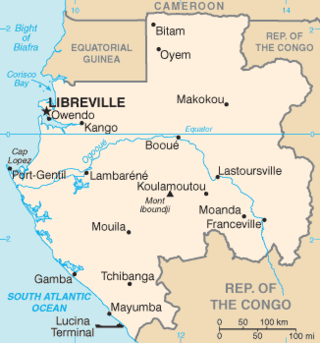
The 1964 Gabonese coup d'état was staged between 17 and 18 February 1964 by Gabonese military officers who rose against Gabonese President Léon M'ba. Before the coup, Gabon was seen as one of the most politically stable countries in Africa. The coup resulted from M'ba's dissolution of the Gabonese legislature on 21 January 1964, and during a takeover with few casualties 150 coup plotters arrested M'ba and a number of his government officials. Through Radio Libreville, they asked the people of Gabon to remain calm and assured them that the country's pro-France foreign policy would remain unchanged. A provisional government was formed, and the coup's leaders installed Deputy Jean-Hilaire Aubame, who was M'ba's primary political opponent and had been uninvolved in the coup, as president. Meanwhile, M'ba was sent to Lambaréné, 250 kilometres (155 mi) from Libreville. There was no major uprising or reaction by the Gabonese people when they received word of the coup, which the military interpreted as a sign of approval.

Paul Marie Indjendjet Gondjout was a Gabonese politician and civil servant, and the father of Laure Gondjout, another prominent Gabonese politician. Gondjout was a member of the Mpongwe ethnic group, and served in the French colonial administration from 1928, and founded the Cercle amical et mutualiste des évolués de Port-Gentil in 1943. He was a delegate to the French Senate from 1949 to 1958, and founded the Gabonese Democratic Bloc (BDG). In 1954, Léon M'ba joined the party and eventually overthrew Gondjout as leader.
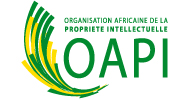
The Organisation Africaine de la Propriété Intellectuelle or OAPI is an intellectual property organization, headquartered in Yaoundé, Cameroon. The organisation was created by Bangui Agreement of March 2, 1977. The Bangui Agreement was subsequently amended in 1999.

Dampa Sangye was a Buddhist mahasiddha of the Indian Tantra movement who transmitted many teachings based on both Sutrayana and Tantrayana to Buddhist practitioners in Tibet in the late 11th century. He travelled to Tibet more than five times. On his third trip from India to Tibet he met Machig Labdrön. Dampa Sangye appears in many of the lineages of Chöd and so in Tibet he is known as the Father of Chod, however perhaps his best known teaching is "the Pacification". This teaching became an element of the Mahamudra Chöd lineages founded by Machig Labdrön.
Moona is a West African rapper. Known for her flow, sharp and poetic lyrics as well as for her active involvement with the youth, Moona is an active member of United Artists for African Rap (AURA) in which she represents her native Benin. Besides, Moona is the only female rapper to have been selected by Africa Unsigned among artists of the continent to receive support for their next production.
Shukseb Jetsunma Chönyi Zangmo (1865–1953) was the most well known of the yoginis in the 1900s, and was considered an incarnation of Machig Lapdron. She was the abbess of Shukseb nunnery, and was a Nyingma Tibetan Buddhist teacher. She made the nunnery once again into a center for the special teachings of the Shugseb Kagyu. The nunnery still exists in Tibet today, and in fact is one of its most active nunneries.
The 2023 U-20 Africa Cup of Nations qualification was a men's under-20 football competition which decided the participating teams of the 2023 Africa U-20 Cup of Nations.
Emmanuella Jurielcy Atora Eyeghe is a Gabonese taekwondo practitioner. She qualified to represent Gabon at the 2024 Summer Olympics.










